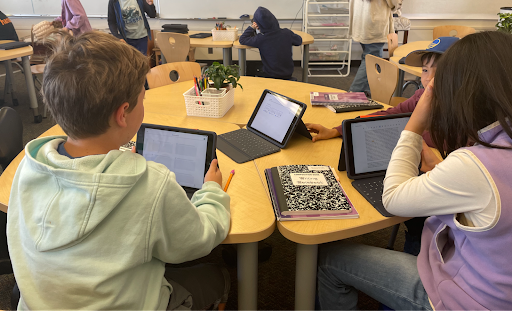
Prospect Sierra School is implementing the newly published Being a Writer, Third Edition for its fourth grade students under the guidance of veteran Professional Learning Lead Stacey Abeyta.
In this second blog, Stacey and Prospect Sierra teachers share their experiences implementing the Expository Nonfiction unit of Being a Writer, Third Edition.
If you missed the first post in this series, read it here.
Stacey Abeyta Reflects on Teaching the Expository Nonfiction Unit of Being a Writer
How does Being a Writer’s Expository Nonfiction unit help students lean into their curiosity?
Simply, the choice is theirs. Student writers have complete autonomy to pursue whatever interests them.
They start the unit by taking an inquiry stance, asking questions that interest them, exploring these questions further, and continuing their inquiry as they gain more knowledge about their topics.
Questions generate more questions as student writers engage in their exploration of topics. Being able to have this autonomy fosters independence and agency in student writers.
Being able to have this autonomy fosters independence and agency in student writers.
Topics were rich and varied. Students researched everything from toothpaste to covered wagons, from chocolate to board games. Just like in the previous units of Being a Writer, student voice and choice drove the student writing.
What role does partnership play in the Expository Nonfiction unit? How do you notice students developing their skills as partners working together?
In previous units, writers have engaged in formulating and developing their own ideas as writers. They have worked with peers to give and receive feedback to improve their writing with a reader in mind. The focus in the earlier units has been supporting students in talking about writing.
In this unit, student writers elevate partner work as they reach a consensus about a topic to pursue, share the workload for the writing, consider how to organize their writing and what is “fair” for each writer.
[S]omething beautiful about the design of this unit is that once students agree on a topic, they continue to pursue questions that are of interest to them while working within the partnership.
I think something beautiful about the design of this unit is that once students agree on a topic, they continue to pursue questions that are of interest to them while working within the partnership.
In most units of Being a Writer, the recommendation is random partnerships so that students have the opportunity to work with diverse partners throughout the year. In this unit, however, the guidance in the program is to strategically create partnerships, keeping in mind that the students need to rely on one another to successfully bring their writing to publication.
I think the common tendency here would be to match a stronger writer with a writer who might need more support. The teachers at Prospect Sierra, however, made a very different decision. They partnered writers through the lens of who might enjoy/have fun working with one another.
The results were incredible. Even though the writing in this unit is rigorous, there was so much joy in the classrooms as writers chose topics they were vested in and were able to work with partners they enjoy.
The design of Being a Writer’s expository nonfiction unit is intentional—and it covers a lot of ground. What do you appreciate about the structure of the unit, as students learn how to consider their audience, write with precise language, create presentations that are interesting and visually appealing, and cite credible sources?
We have said over and over, this writing unit transcends all content matter. The skills that students are learning go so far beyond simply producing a piece of expository text.
They are learning how to collaborate, cite and evaluate sources, determine which information is relevant and which is extraneous, how to develop a Powerpoint presentation, and the importance of precise language, just to name a few.
Aren’t these the skills we wish all students had? Aren’t these the skills that promote critical thinking? And aren’t these necessary skills for student success?
The skills that students are learning go so far beyond simply producing a piece of expository text.
This unit does cover A LOT of ground! We would share that this is the most challenging unit that has been taught this far. We all expressed gratitude that students have had the opportunity to write in other genres before engaging in this learning. The decision was made to take as much time as was needed to fully engage in this unit because of all of the benefits of this rich instruction.
Although the guidance in the program was to complete this unit in seven weeks, the teachers decided to extend the unit so that students had the time they needed to research, to revise, and to produce a slide show presentation that would resonate with their audiences.
What else have you observed about this unit?
We continue to appreciate the integration of the grammar skills and conventions work within the units.
We are noticing that not only is the writing more accurate, but that student writers are spending more time in the revision and proofreading processes within units, as they have developed a greater skill set to improve their writing.
Something else that was noticeable is the writer’s sense of audience in this unit. Writers carefully edited their writing with the reader in mind, thought carefully about the presentation process, and enjoyed not only creating their own pieces to share but also enjoyed learning from one another.
Reflections from Prospect Sierra Fourth-Grade Teachers
What do you notice about how your students are navigating online research, taking notes online, and using Google Slides to present their work?
The online research component could be tricky at times. It was important for us to vet the websites before letting the students dive into research. We took the idea of finding quality sites very seriously and I think that benefitted the students.
We were pleasantly surprised by the online note taking after being very nervous about the set up. It was hard for us to imagine them reading text online and taking notes in a Google doc at the same time but it did end up working out.
The students really thrived with the Google Slides. That might actually have been our favorite part. We loved that they had to choose a really precise photo to enhance their writing.
The final presentation made it possible for them to read their entire report to the group in an engaging way. The slideshows were also very fun to share with parents!

How do you notice students applying their developing skill set for expository nonfiction writing throughout the school day—in social studies, science, mathematics, and so on?
We are ending the year with an optional research project for our Japanese Incarceration unit and we expect the students will use what they learned during the expository nonfiction unit to support them in that process.
What do you notice about students’ sense of ownership of their research projects?
The students LOVED this project and felt a lot of ownership.
Interestingly, we think that the partnership work really enhanced their sense of ownership over the project. They loved working with a partner and honestly, every single student was highly engaged in the process. They were so proud to present their final products to the class. Additionally, students generally maintained a pretty high level of engagement throughout the process, which was not always easy.
Related:
Read the first blog in the series: Prospect Sierra School Previews the New Being a Writer, Third Edition
Get Being a Writer Sample Lessons
Download free Being a Writer sample lessons and the program brochure.
